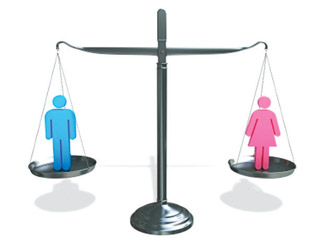When females strike back…
 ‘How can we have an invasion when the troops storm ashore and then
change their minds!’ - Bob Hope, entertainer, about women in combat. ‘How can we have an invasion when the troops storm ashore and then
change their minds!’ - Bob Hope, entertainer, about women in combat.
Whatever position you hold or whatever power you carry, women are
more likely to face stereotyping in the society. With all other women in
the world, I experience this phenomenon everyday even being among the
most loved ones of my life. Gender stereotyping is just another brick
which the society made out of.
Gender stereotyping in the media is a well-established fact. Nowhere
is it more obvious than in advertising, where the authoritative male
voice-over is a regular feature. The attribution of specific and indeed
limited gender roles by the advertising industry and by society in
general is a fascinating subject in its own right.
I want to look initially at just one element of it, eg. the portrayal
of women’s language and communicative skills as a component of their
general behaviour patterns. Usually, references to women’s linguistic
behaviour are implicit rather than explicit. There are occasions when
deep-rooted expectations and prejudices come to the fore, displaying a
stereotypical picture of women as creatures who talk a lot, interrupt
men and are illogical and changeable.
 Not only the content of speech, the tone and stress patterns are also
become key factors in stereotyping women. For example, former British
Prime Minister Margaret Thatcher lowered her pitch, spoke more slowly
and reduced the variability of her intonation patterns. Here she was
implementing a ‘contest’ strategy which is generally supposed to be
employed by men. Not only the content of speech, the tone and stress patterns are also
become key factors in stereotyping women. For example, former British
Prime Minister Margaret Thatcher lowered her pitch, spoke more slowly
and reduced the variability of her intonation patterns. Here she was
implementing a ‘contest’ strategy which is generally supposed to be
employed by men.
One has also to contend with society’s expectations of women as
ladies who speak politely and the fact that lower pitch is associated
with greater credibility. Studies have shown that the lower the news
reader’s voice, the more people are inclined to believe the news!
Recently growing attention has been devoted to a new approach in
language termed gender linguistics. That happened due to the fact that
social factor has become determinative in language studies which are
deeply related with an individual and society.
Linguistic study of gender stereotypes in different kinds of texts is
among pioneer researches. Stereotypes, therefore, can instigate
prejudice and false assumptions about entire groups of people, including
the members of different ethnic groups, social classes, religious
orders, the opposite sex, etc.
A stereotype can be a conventional and oversimplified conception,
opinion, or image, based on the assumption that there are attributes
that members of the “other group” have in common. Stereotypes are forms
of social consensus rather than individual judgments. Although sex is
usually defined as a person’s biological traits, gender is defined as
how a person identifies themselves to the world.
Gender relates to those affectations that are attributed to men and
those affectations that are attributed to women. Gender stereotypes are
those ideas, usually imposed by society of what is expected of men and
women in the social structure.
The presence of gender stereotyped elements allows discovering unique
language characteristics distinguishing texts for men and women. It’s no
exaggeration to say that gender stereotypes are constantly present in
intercultural communication: linguistic elements can be gender neutral
as well as gender significant.
There is considerable divergence between conventional stereotypes and
the reality of women’s speech. Since linguistic behaviour is not rigidly
divided along sex lines, it is easy to discount differences as
non-existent or unimportant. Linguistic research in the last twenty
years has done nothing if not prove that variation does exist and that
women are linguistically, as well as socially, at a disadvantage.
Researchers have shown consistently that women speak less than men in
public fora and that men interrupt women more than the other way round.
In my point of view, language is one of few most powerful tools which
women belong!
|





